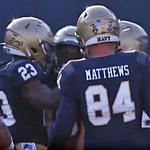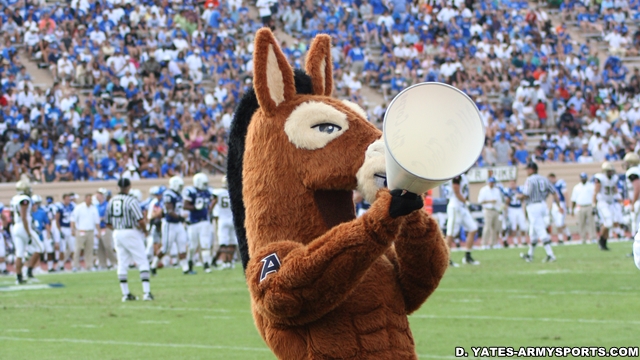
Army, Navy and Air Force all wrote identical stories on defense, but the Black Knights, Midshipmen, and Falcons wrote different stories on offense. What that means heading into the rest of the season is unclear, and it makes these journeys even more interesting.
Army, Navy and Air Force each allowed just seven points apiece in their season openers. Army had to be very pleased to limit Rice to just seven points. New defensive coordinator John Loose replaced Jay Bateman (who had a great debut with North Carolina against South Carolina on Saturday) and produced a strong performance from his players. Getting that level of continuity from the defense had to make Jeff Monken very happy. Army needed every last ounce of that defensive quality, given how much the offense struggled in Week 1.
 Army’s offense was such a humming, efficient machine at the end of the 2018 season that it was bound to regress this season. A difficult opener is not cause for alarm in West Point. Only the failure to adjust and improve will be. Army could have let this game slip away entirely. The fact that the Black Knights took care of business shows that – at least for now – this is still the transformed program which has turned the corner, and is poised to continue to control the Commander In Chief’s Trophy Series with its defense, a unit Air Force and Navy have not been able to solve.
Army’s offense was such a humming, efficient machine at the end of the 2018 season that it was bound to regress this season. A difficult opener is not cause for alarm in West Point. Only the failure to adjust and improve will be. Army could have let this game slip away entirely. The fact that the Black Knights took care of business shows that – at least for now – this is still the transformed program which has turned the corner, and is poised to continue to control the Commander In Chief’s Trophy Series with its defense, a unit Air Force and Navy have not been able to solve.
That said, Navy and Air Force certainly got their seasons off to good starts on Saturday. The Midshipmen and Falcons have to be quietly encouraged by what they did.
 No, it’s not THAT big a deal that Navy and Air Force both won by at least 38 points. They fattened up on FCS opponents in games which had the feel of glorified practices. Navy crushed Holy Cross, while Air Force cruised past Colgate. No one should get the impression that Navy and Air Force are ready for the tougher opponents on their schedules.
No, it’s not THAT big a deal that Navy and Air Force both won by at least 38 points. They fattened up on FCS opponents in games which had the feel of glorified practices. Navy crushed Holy Cross, while Air Force cruised past Colgate. No one should get the impression that Navy and Air Force are ready for the tougher opponents on their schedules.
What does matter, though, is that Navy and Air Force generally did what they were supposed to do. This has been missing from both programs in recent seasons. Being solid and dependable – not necessarily spectacular – is what the Mids and Falcons have strayed from, certainly in 2018, when both programs missed bowl games. Saturday was not a transformative moment for Ken Niumatalolo and Troy Calhoun. It was a back-to-basics moment which provided a template for future performances.
There is no need for grand predictions or proclamations based on these results, but Navy and Air Force avoided the clunky, passive, flustered performances which weighed down these teams a year ago. That is all the coaching staffs reasonably could have asked for in Week 1. They got what they needed. Now they can try to reinforce better habits in their players.
Army’s next game is this upcoming Saturday at Michigan. The Black Knights almost won at Oklahoma last year, so Michigan certainly won’t scare them. This is a great test for Army and a chance to play a team which can teach a lot of lessons for the rest of the season.
 Army certainly grew in every way imaginable as a result of the narrow loss to Oklahoma in 2018. That game toughened up the Black Knights and gave them a lot of belief for the rest of the year. It provided them a roadmap and an awareness of what they needed to do better. Michigan can be the same vehicle for improvement in 2019.
Army certainly grew in every way imaginable as a result of the narrow loss to Oklahoma in 2018. That game toughened up the Black Knights and gave them a lot of belief for the rest of the year. It provided them a roadmap and an awareness of what they needed to do better. Michigan can be the same vehicle for improvement in 2019.
Navy’s next game is not until Sept. 14, and the same goes for Air Force. The Midshipmen will play their AAC opener against East Carolina, a team they should handle. The Falcons will play Colorado, a team which scored 52 points against one of Air Force’s Mountain West Mountain Division rivals, the Colorado State Rams. Air Force should get a lot of value out of its film study.




Be the first to comment